My mom was on a date with a man who later would become my stepdad. They were in a bar in Corry, Pa., an hour outside of my hometown of Erie. For some of the time we lived in Corry, she and I were the only black family in the town. Mom stepped out to use the lady’s room.
According to my stepdad, onlookers gazed at my mother as she was walking to the bathroom and asked him who she was because they had “never seen a black woman that beautiful before.”
My stepdad, who is white, proudly told the gawking men at the bar that she was his girlfriend. The men continued to stare. He also mentioned somewhere in the exchange of words that she was Haitian. One of the men at the bar scoffed and said, “Better watch out, she’ll put a curse on you.” They turned their backs as my mother approached.
Who decides how beautiful a black woman is? And who sets the standard for black women and their beauty in America?
I grew up going to school in a predominantly white suburb in Erie. People around me always reminded me subtly or not that my skin was different. Though I was surrounded by humans just like myself, I easily felt out of place. My ethnicity was something that was often pointed out. It certainly was difficult at some points, feeling like I could not connect with my peers, that there was any type of separation between us, and wondering why my skin had to play a factor so frequently.
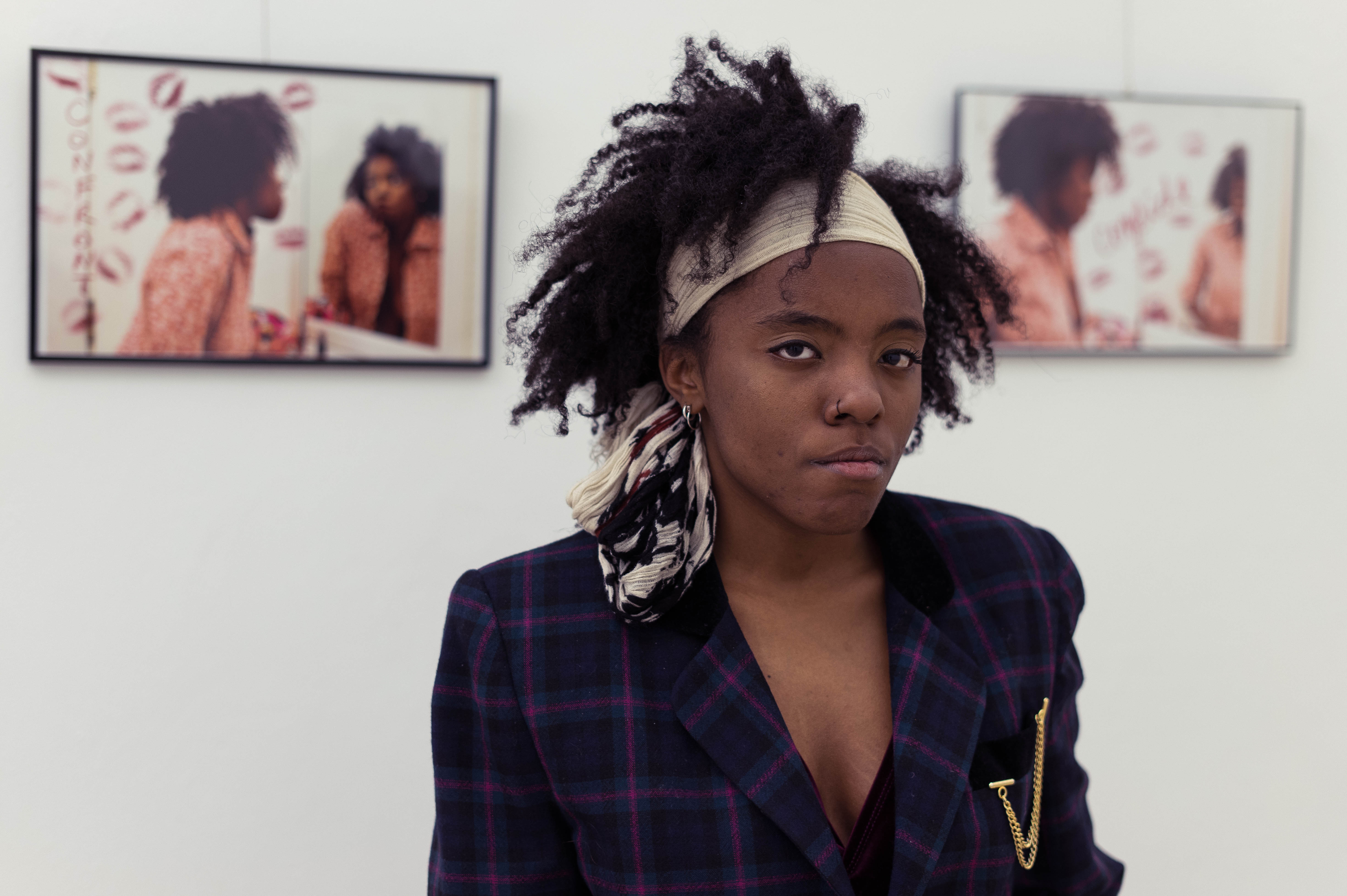
Corrine Jasmin's photography focused on how black women are perceived in media was displayed at the Carnegie Library. (Photo by Aaron Warnick/PublicSource)
In my early adolescence, I had heard enough black jokes that I started to beat people to the punchline so that the sting didn’t have to hurt as badly. The intimacy in relationships and friendships often led to partners and friends confiding in me that they were relieved I “wasn’t like the rest.” I was never sure exactly what that meant. Who are “the rest” and how do they differ from me?
It was when I stopped straightening my hair that I began connecting with my ethnicity. I was filled with a positive and powerful energy when I wore my hair in its natural form. I felt more connected to its roots as well as my cultural roots. Hair is a large part of my culture. People would tease my mom about her beautiful, lengthy hair. Oftentimes, the jabs would be from other black women who would shame my mom for not admitting she had a weave. They assumed she did, but she’s never had one. I specifically recall a group of black women taunting my mom because of the length of her hair, calling her a witch. This really upset her. With instances like this stirring in my mind, I decided to create something for the frustrations and turmoil black women frequently experience.
I could walk around with my head down, mad at the world, endlessly angry with the ignorant. Or I could step out into the world, share my experiences, share my photography, bring awareness to social issues and take a leap toward change. I choose growth. The experiences I’ve had with disconnect and discrimination have only further inspired me to reach women to let them know that they are not alone. It’s OK if you’ve been hurt; it’s OK if you are hurting. No one creates the standard of the black woman in America.
My photography series, entitled “…For a Black Girl (II), is something created to paint a picture of life through a woman’s eyes. The series puts a variety of topics in question. Society’s idea of what a woman should or shouldn’t be and specifically what a black woman should or shouldn’t be. Racism, prejudice, verbal violence, microaggression, beauty and femininity. Each frame holds an array of questions we can ask ourselves. I chose to do self-portraits as a way to deconstruct myself and quite literally reflect on who I am today. I also included found photos of my mother and grandmother as well as current photos I captured of my mother and grandmother.
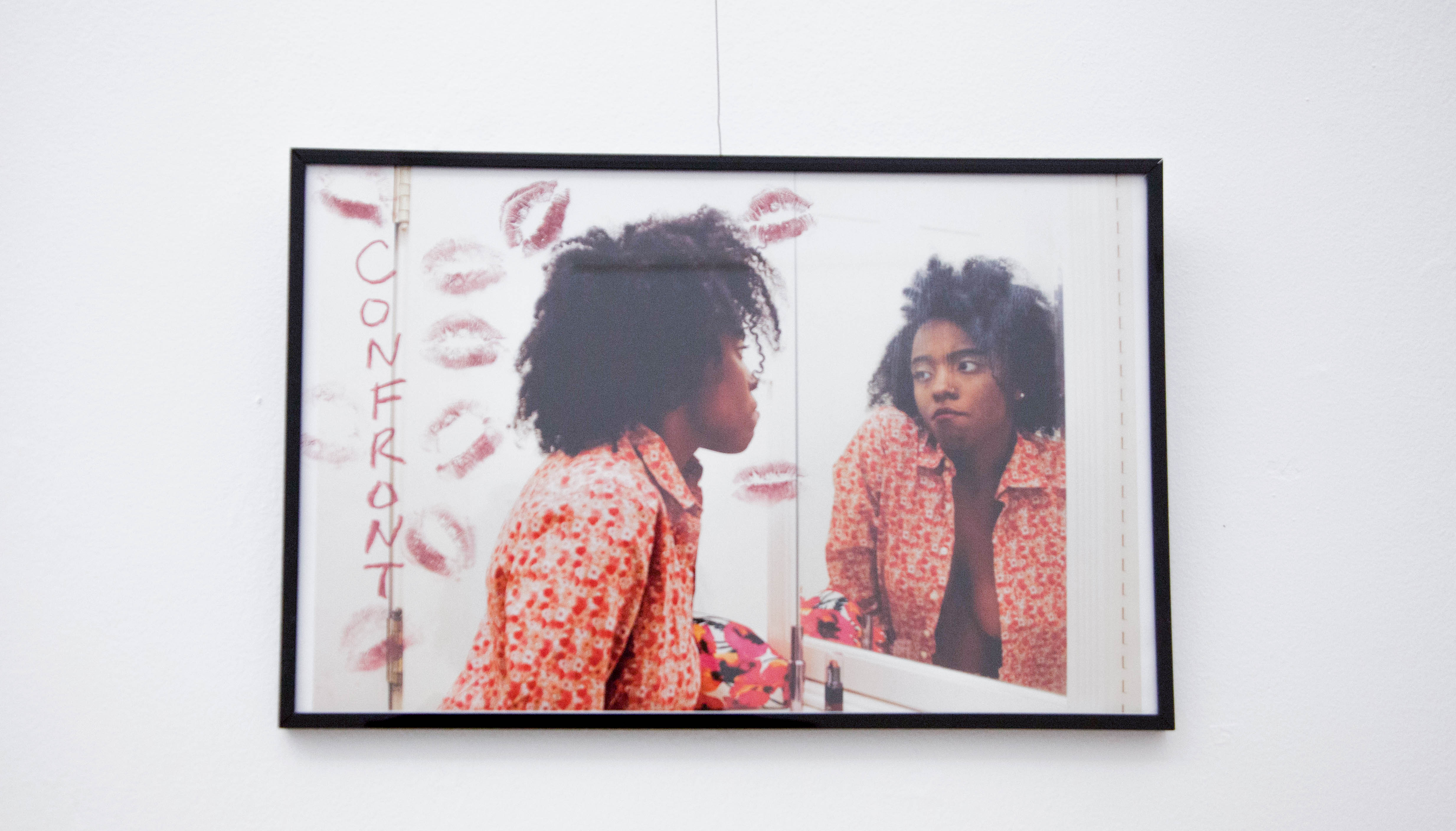
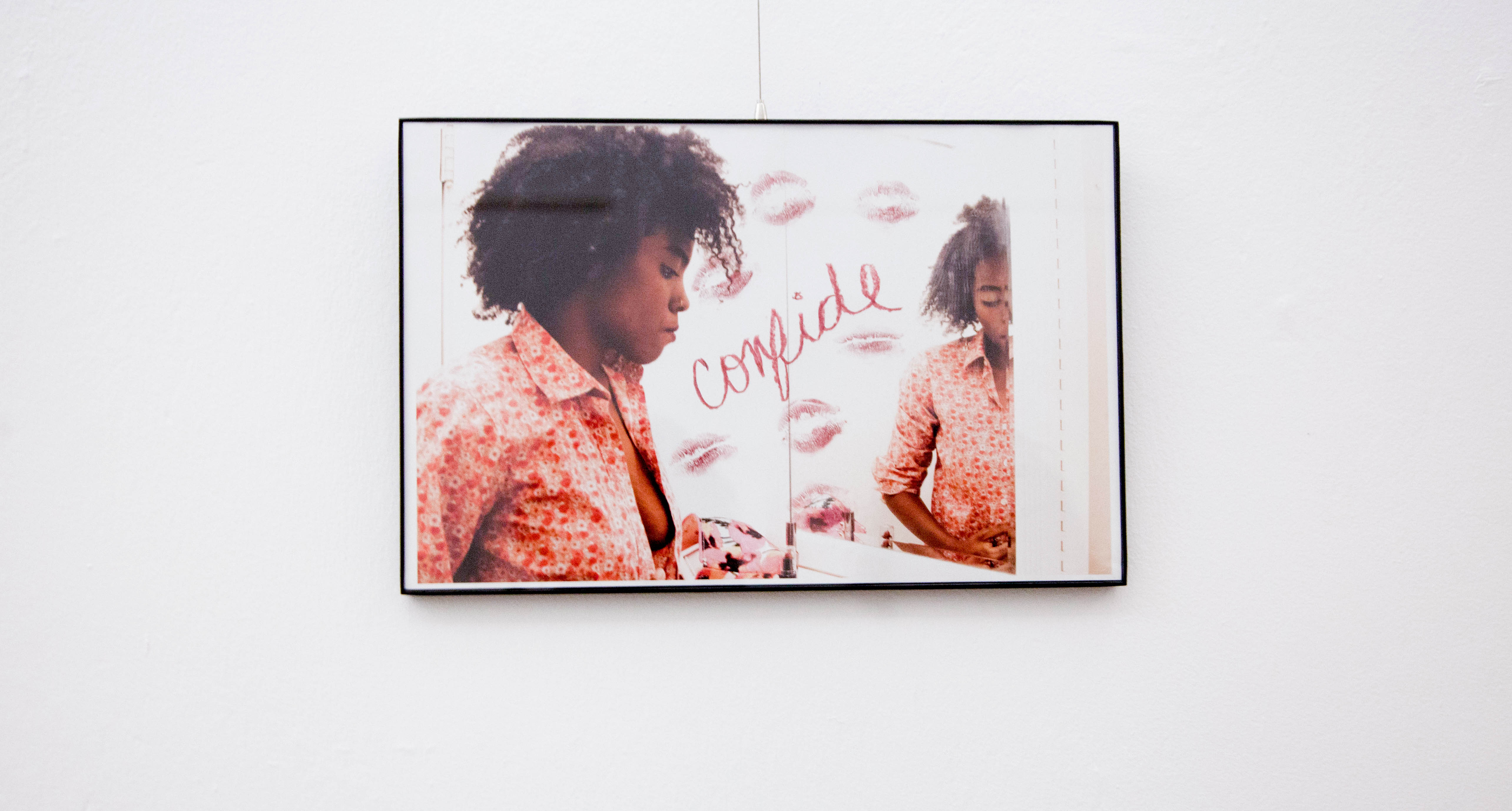
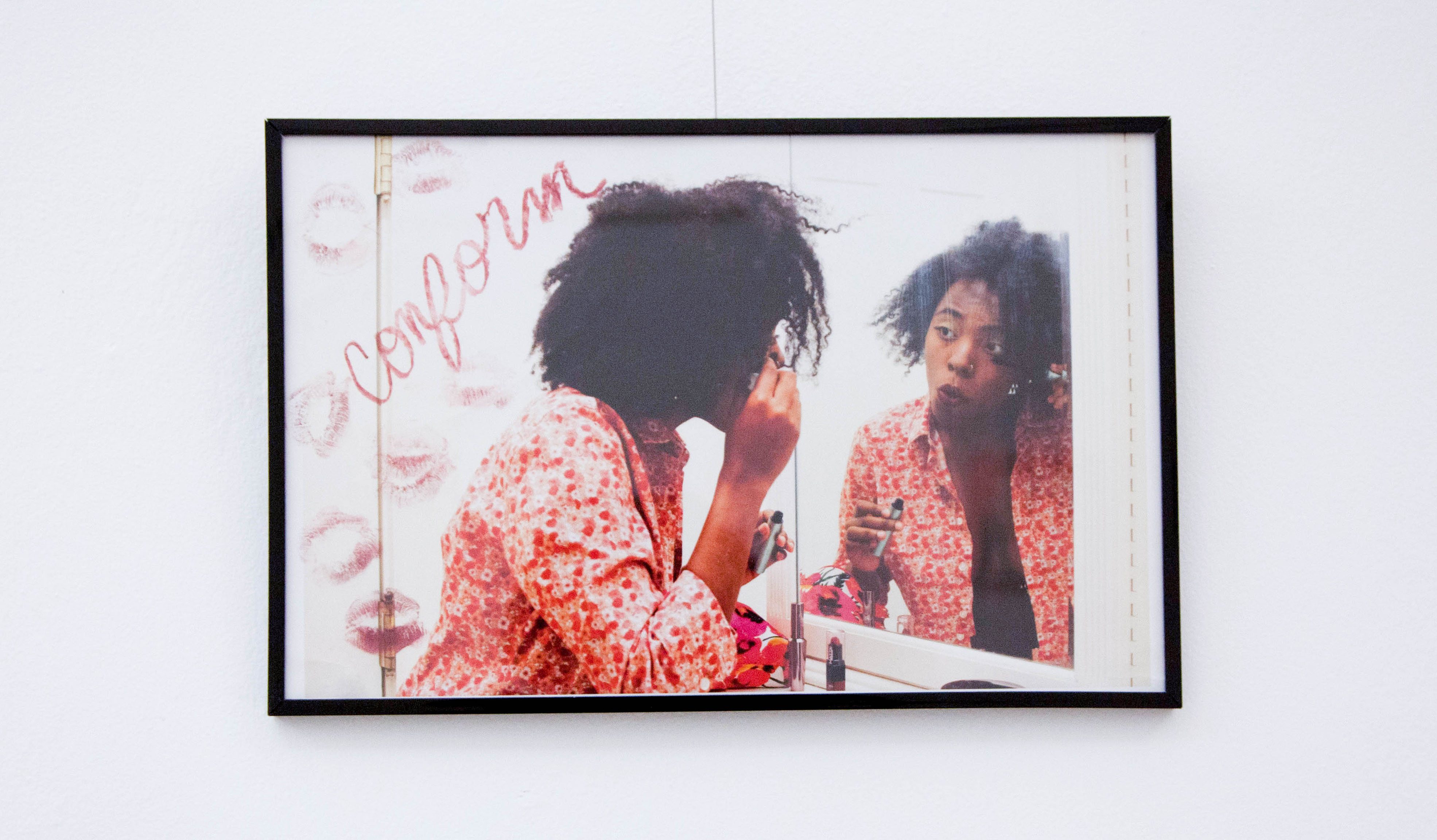
Corrine Jasmin says of her art: "These three self -portraits aim to express literally confronting oneself in the mirror and questioning what is seen in front of them. With these photos, 'Confront' is to face thyself, 'Confide' is to retract within thyself, or becoming one with you, and 'Conform' is to act upon the norm or what is expected – in this very specific case, applying makeup to appear more appealing." (Courtesy of Corrine Jasmin)
For the self-portraits, I aimed to mimic what might be a makeup ad in a beauty magazine. The idea is to paint a picture of the frustrations that women of all ages may experience. How do we rise above a stereotypical male perspective? When will women stop tearing each other down? Do women have to wear makeup in order to be considered beautiful? Who do we put our makeup on for?
I’ve heard offhand comments throughout my life, mostly all derived from this: “Oh, you’re so pretty for a black girl.” For a black girl. There are people who believe that such statements serve as genuine compliments. To others, they are an example of a microaggression. Microaggressions can be considered as being prejudice in a veiled way, through an action or the words you choose These comments often emphasize the line of separation between black and white when there shouldn’t be a line at all.
So, what is beauty? It’s certainly something to think about. Is beauty fair skin, is beauty makeup, and is beauty straight hair or curly hair? Is beauty black and white or does it have no defining line? But what sense does it make to have one concrete idea of beauty?

This is a photograph of Corrine Jasmin's grandmother. Corrine says: "She’s met with the gaze of two men who I have made anonymous with white lace. She stands tall, in all her beauty, ignoring the male gaze." (Courtesy of Corrine Jasmin)
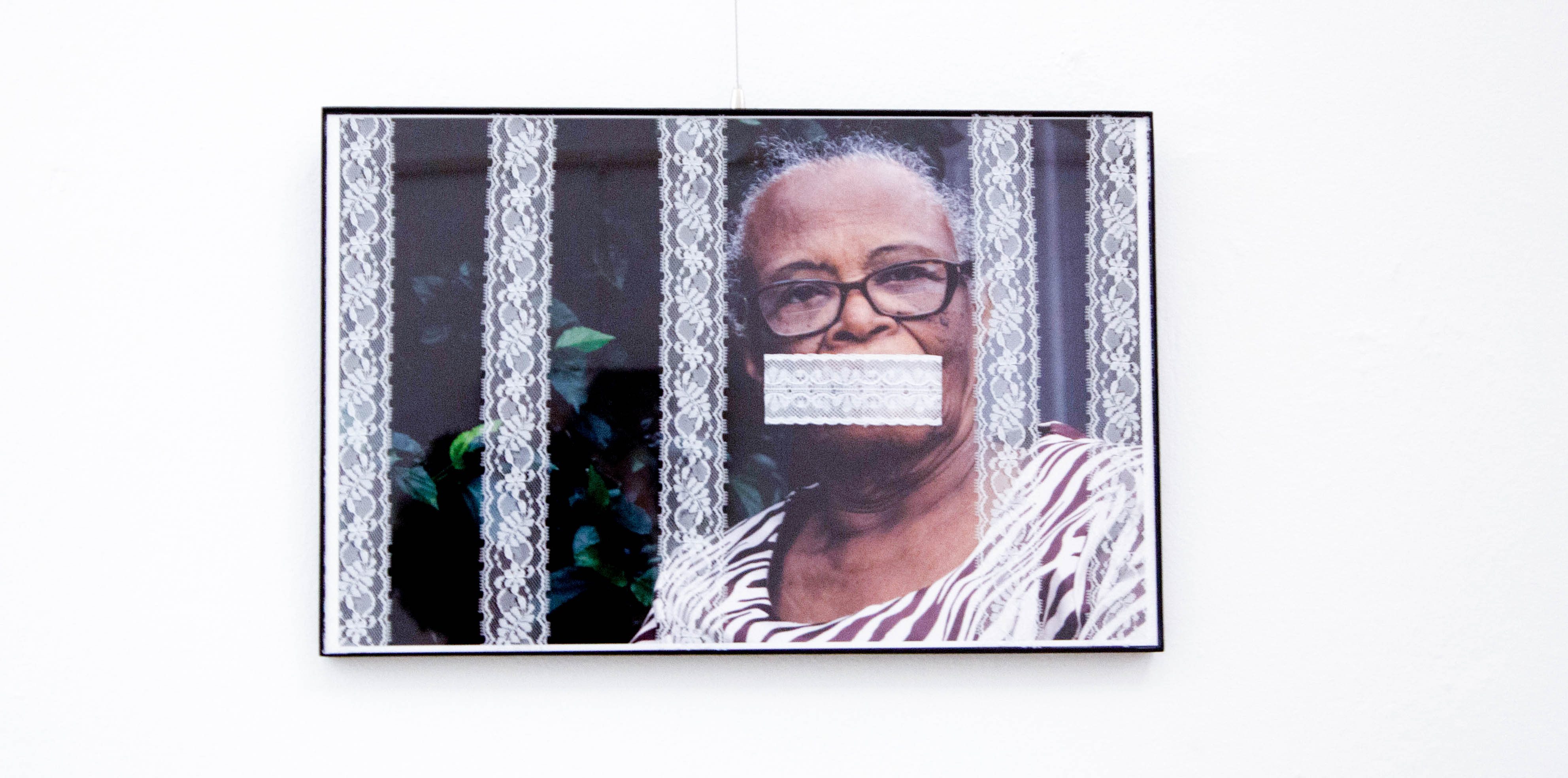
This is a current photograph Corrine Jasmin took of her grandmother in her home away from Haiti in Orlando, Fla. "The lace silences her, but her eyes speak her pain. The vertical lace serves as shroud or a cell," Corrine says. (Courtesy of Corrine Jasmin)
In history and in current day, some argue the more fair the skin, the more beautiful. The past dictates what happens today with models of color getting their skin airbrushed or retouched on magazine covers so their skin appears to be lighter. Skin lightening (sometimes referred to as whitening) cream is something that exists and is sold in stores or on the web. A lot of times women of color can be seen in the advertisements promoting the skin lightening products.
It’s not uncommon to see before and after photos of women who aren’t white having an emotionless expression painted on their face for the “before” photo and for the “after” photograph they’re grinning ear to ear. It’s almost as if to say one can be a happier person with lighter skin. These ideas can often sit within our subconscious.
My skin is wholeheartedly a part of my identity, so to alter my skin would be to alter and shame who I am. In this day and age, it is the job of women to band together and lift one another up. It’s time to rise above the restrictions placed upon women by society. Men should do the same. We are society. We create the change simply by being “us.”
Love your skin.
Corrine Jasmin is an Afro-Haitian artist and writer based in Pittsburgh. She has expertise in filmmaking and photography, blending art and activism. She has been writing and creating since her early youth and has aspirations to make an impact in the world by sharing work that is relatable, filled with social commentary, and a direct reflection of herself as well as her environment. Corrine’s work often includes, but is not limited to fashion, femininity and tenderness, youth culture, and African-American culture. Corrine can be contacted via her website at www.corrinejasmin.com or on Instagram @corrinewho.
